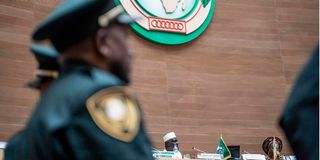China shows security, stability is a factor in investment choices

Moussa Faki Mahamat (centre), Chairperson of the African Union (AU) Commission gives an address during the closing ceremony of the 36th Ordinary Session of the Assembly of the African Union (AU) at the Africa Union headquarters in Addis Ababa, Ethiopia on February 19, 2023.
The African Union was last week gathering for the annual ritual of the Ordinary Summit of the Heads of State and Government in Addis Ababa, Ethiopia. As is tradition, various global powers either sent special envoys or sent special messages to the continental body.
Chinese President Xi Jinping sent his congratulatory message, praising the AU for speeding up the roll-out of the Africa Continental Free Trade Area agreement (AfCTA) also for playing “an important role in mediating hotspot issues in Africa, which has boosted Africa's international status and influence.” According to Xi, Africa should continue with this trajectory.
China, incidentally built the headquarters of the African Union, an imposing tower-and-hall building in Addis Ababa.
China is also the biggest bilateral trading partner in Africa but which has been criticised for a ‘debt trap’ of the continent, due to its heavy lending for infrastructure building.
In most cases, China dismisses this criticism and says enduring partnership in Africa is due to its non-interference policy or no-strings-attached relations.
But China has shown recently that it can slow down engagements where insecurity or political instability is rife. In Africa, China named a special envoy for the Horn of Africa last year, showing it won’t stay on the fence as investments are threatened.
There are lessons beyond Africa, however. In Pakistan, one of the countries along the Belt-and-Road Initiative (BRI), China has indicated several times that things won’t be normal if insecurity persists.
On Friday, China’s top diplomat Wang Yi met with Pakistani Foreign Minister Bilawal Bhutto Zardari on the sidelines of the Munich Security Conference, another international event that was going on last week.
Wang, a former Foreign Minister is now Director of the Office of the Central Commission for Foreign Affairs. He said Pakistan was an “all-weather” partner. But referred to concerns on security.
“China firmly supports Pakistan in maintaining security and stability as well as achieving development and revitalisations, and stands ready to provide assistance within its ability to help Pakistan overcome temporary difficulties,” a dispatch published by Chinese media said.
There was no indication that China would cut out Pakistan yet. In any case, Wang said the ties were “rock solid” and that Beijing was ready to work with Pakistan on all previous agreements. Days earlier, Pakistan had launched a nuclear power reactor built by the Chinese for $2.7 billion.
That Beijing keeps talking about the security problem indicates it is a factor in the ties. Pakistan has recently experienced a spate of terror attacks targeting the Chinese. In September last year, an institute run by the Chinese in the port city of Karachi was attacked just after a medical centre had been targeted. In Baluchistan, which lies on a special Chinese-funded corridor, a Chinese official was also killed after terrorists targeted a hotel he was staying. Chinese contractors were also killed in a van near their work site. Beijing expressed concerns about the safety of its nationals in all these incidents.
In fairness, Pakistan is facing an economic crisis, which would naturally cause China to slow down any commitments even though it has been receiving regular funding from Beijing since 2018, including a $2.3 billion loan last year, according to available data.
But some observers think China also looks at a bigger geopolitical picture. Last week, Foreign Policy magazine noted that Beijing looked on last year as India excluded Pakistan from the sidelines high-level event at the BRICS Summit, which had included emerging economies.
“In the past, China—which hosted the event—might have stepped in to help Pakistan. Some analysts have argued that Beijing views the current Pakistani government as too unstable to be a viable partner, the magazine observed.
Both Pakistan and China have India as regional rivals. But some say China will look at all big powers as rivals, limiting the scope of cooperation.
“Increasing US-China competition puts limits on cooperation between Pakistan and the United States, extending Islamabad’s reliance on Beijing for economic and military assistance. Pakistan’s own push for a greater partnership with Russia comes amid a deepening China-Russia alliance,” said Foreign Policy.
Russia, however, may be no alternative it is both competitions to the US and China, which hasn’t condemned Moscow for invading Ukraine.





